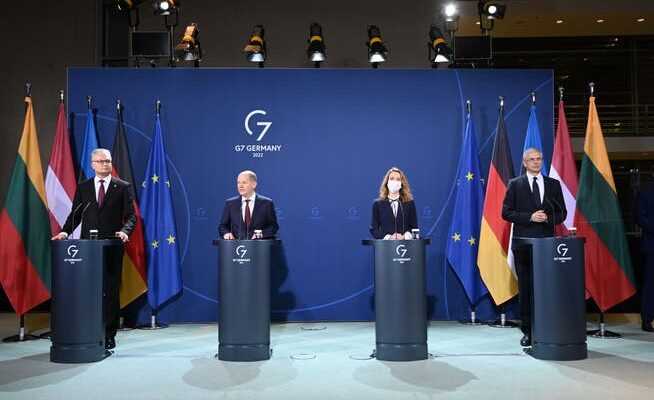Representatives of Moscow and Kiev met in Berlin, and the German Chancellor also received visitors from the Baltic States. The Latvian Prime Minister called on Germany to play a leading role in solving the current crisis.
Lithuanian President Gitanas Nauseda, German Chancellor Olaf Scholz, Estonian Prime Minister Kaja Kallas and her Latvian counterpart Krisjanis Karins (from left to right) in Berlin on Thursday.
Efforts to resolve the Russian-Ukrainian conflict continue. Representatives of the participating states of the so-called Normandy format met in Berlin on Thursday; in addition, German Chancellor Olaf Scholz received Estonian Prime Minister Kaja Kallas, Lithuanian President Gitanas Nauseda and Latvian Prime Minister Krisjanis Karins.
Like Poland, the three Baltic states are among the NATO countries that are pushing for a tougher stance on Russia. They support arms deliveries to Ukraine and reject the commissioning of the Nord Stream 2 gas pipeline. Germany does not want to supply arms, and during his visit to Washington earlier this week, Scholz could not bring himself to announce that Nord Stream 2 would be shut down in the event of a Russian attack; He left it to the American President Joe Biden to say this.
Germany increases its troop contingent
Kallas had already explained before her trip to Berlin that it was up to each country to decide what kind of help it wanted to offer Ukraine, but that Estonia thought it was important “to help in every possible way”. This also includes the delivery of weapons. Estonia has asked the German government for permission to ship nine artillery pieces from former East Germany stocks to Ukraine. The request has been pending for weeks.
At the press conference that Kallas, Nauseda, Karins and Scholz held before their meeting, the usual phrases could be heard: The German chancellor once again stated that they were ready for a dialogue with Russia, but that Russian aggression would have serious consequences. Lithuanian Nauseda recalled that five years ago the Bundeswehr took over the leadership of the NATO battalion in his country. Nauseda praised Germany’s willingness to further increase the contingent of around 500 Bundeswehr soldiers currently stationed in Lithuania.
Existing differences of opinion were at best only hinted at: Estonian Kallas pointed out that her country spends 2.4 percent of its gross domestic product (GDP) on defense; her Latvian counterpart Karins said it was 2 percent in his country. Both countries and Lithuania (2.1 percent) are already meeting the target that the NATO member states have set for 2024, while Germany, with 1.4 percent of its GDP, is still well away from it. Karins demanded that Berlin play a leading role in solving the current crisis.
Germany wants to keep channels of communication open
The deliberations of the Normandy format, which took place in parallel, dragged on into the evening. Russia, Ukraine, Germany and France are represented in the discussion group; on Thursday it was the foreign policy advisers of the governments who met. No results were known at the time of going to press.
The format was established in June 2014, just a few months after Russia annexed Crimea. At that time, Russian President Vladimir Putin, then German Chancellor Angela Merkel and the then Presidents of Ukraine and France met on the fringes of the commemorations of the 70th anniversary of the Allied landings in Normandy. The format is currently the only forum in which representatives of Moscow and Kiev can talk to each other directly; the last meeting took place on January 27th.
German politicians also like to use the Normandy format when it comes to justifying why they don’t want to send weapons to Ukraine: Germany must keep this and other channels of communication open to Moscow and shouldn’t be too harsh on the Russians bump. Scholz has the chance to use these channels next week: On Tuesday, the German Chancellor will visit Moscow; in Kiev he stops by a day earlier.
